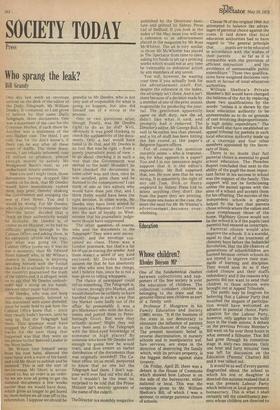Education
Whose children?
Rhodes Boyson MP
One of the fundamental clashes between collectivists and supporters of the free society is over the education of children. The collectivist considers children as belonging to the state and the genuine liberal sees children as part of a family unit.
Professor F. Musgrave in his Family Education and Society (1960) wrote, "It is the business of the state in our democracy to eliminate the influence of parents in the life-chances of the young." The present messianic belief in reverse discrimination, in nursery schools and in manipulative welfare services, are steps in the direction of destroying the family which, with its private property, is the biggest defence against state tyranny.
On Friday, April 25, there was a debate in the House of Commons which showed how Labour is on the side of the bureaucrat, either national or local. This was the reception given to Mr. William Shelton's Bill, of which I was a sponsor, to enlarge parental choice of schools. Clause 76 of the original 1944 Act attempted to balance the advantages of parental choice against the costs. It laid down that local education authorities had to have regard to "the general principle that. . . pupils are to be educated in accordance with the wishes of their parents . . . as far as it is compatible with the provision of efficient instruction . . . and the avoidance of unreasonable public expenditure." These two qualifications have weighted decisions very much in favour of local education authorities.
William Shelton's Private Member's Bill would have changed the balance of the Act by replacing these two qualifications by the words: "unless it is shown by the local education authority to be unreasonable so to do on grounds of cost involving disproportionately high public expenditure." The Bill would also have established an appeal tribunal for parents in each local education authority made up of a chairman and four other members appointed by the Secretary of State.
There is no doubt that full parental choice is essential to good school education. The Plowden Report concluded that next to the ability of the pupil the most important factor in his success in school was the support of the family. This support will not be forthcoming unless the parent agrees with the aims of a school and accepts them for his offspring. The success of the independent schools is greatly helped by the fact that parents chose schools where the values and aims complement those of the home. Highbury Grove would not be the school it is if the pupils (and parents) had entered as conscripts.
Parental choice would also improve the schools. It is a scandal, equal to that of the treatment of chimney boys before the Industrial Revolution, that the life-chances of generations of schoolchildren are harmed because certain schools do not intend to improve their standards of learning and discipline. They would soon do so if they risked closure and their staffs redundancy and if the reasons why' parents did not want to send their children to those schools were brought out at Appeal Tribunals.
The public may be forgiven for believing that a Labour Party that mouthed the slogans of participation would have welcomed an advance in parental choice. Participation for the Labour Party, however, only applies to the bully boys in the trade unions. A debate on the previous Private Member's Bill went on for over three hours in what seemed a filibuster. That Bill had gone through its committee stage in sixty-two minutes. Only one hour and forty minutes' time was left for discussion on the Education (Parents' Charter) Bill and it was talked out.
It would be as well if every parent disgruntled about the school to which his son or daughter is directed this autumn realised that it was the present Labour Party which believes in local government bureaucracy. This is what I shall certainly tell my constituency parents whose children are directed to
schools four or five miles away when they have a perfectly adequate school of their choice within 300 yards. The behaviour of the Labour benches on the Parents' Charter Bill is well worth noting by those who still believe freedom and socialism are compatible.
Dr Rhodes Boyson, formerly headmaster of Highbury Grove School, is Conservative MP for Brent North











































 Previous page
Previous page